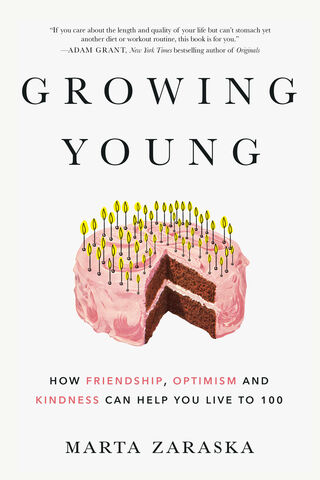Health
The Surprising Secret to Longevity
A new book reveals that the keys to healthy aging aren't what you expect.
Posted July 17, 2020 Reviewed by Devon Frye

How do we age well? It’s a popular question. Most of us want to live a good long time. We want to see our children grow up. And we want to be mentally sharp and physically strong for as long as possible.
Like a lot of people, Marta Zaraska thought the answer lay in diet and exercise, i.e., kale salads and running 10K races. Zaraska writes about science and health and her previous book, Meathooked, was about the history of our relationship with meat. When she became a mother six years ago, her obsession only grew. “I was pureeing the best foods I could find, whatever the organic, novel vegetable of the day was,” she says. “But I came across some research showing me that there might be a completely different way and that I may be overdoing it in the wrong direction.”
That different way is the subject of Zaraska’s new book, Growing Young: How Friendship, Optimism, and Kindness Can Help You Live to 100. She had me at friendship, of course, the subject of my own recent book, Friendship: The Evolution, Biology and Extraordinary Power of Life's Fundamental Bond. But I was curious to hear Zaraska’s take on the subject. I called her at her home in France and we talked about it. (Our conversation is edited for clarity and length.)
What convinced you that diet and exercise were not the whole story for longevity?
There was an analysis I came across that put the numbers in black and white. [It showed] that this complex index of social integration [represents] over 60 percent of mortality risk reduction, which is more than if you quit smoking. Those are huge numbers.

How should we think about diet and exercise?
We overcomplicate diet and exercise by following miracle foods and fad diets. Eating healthy is kind of simple. Like Michael Pollan said: "Eat food. Not too much. Mostly plants."
Same with exercise. Just move. We love the idea of gadgets that measure different things, how many steps you’ve taken and so on.
It is also true that even very basic healthy eating and exercise [don’t compare] with how much your social life affects your health. I never say stop eating healthy. I eat very healthily and I exercise. But don’t forget about the other part. We can combine those things.
You bust some longevity myths in your book. What one thing should people not be doing?
The supplements, for sure. Americans spend an average of $56 per person on nutritional supplements per month. That’s $56 too much. These things are at best doing nothing for you, and at worst they can be killing you. Nobody really controls what’s inside supplements. These are not drugs that have to go through [clinical] trials and are seriously controlled by health agencies. Multivitamin pills don’t act in your body in the same way they do when you ingest them from plants. There are completely different chemical processes happening here. One big study on American physicians shows that those who are popping multivitamin pills were 7 percent more likely to die of cardiovascular disease than those who were not taking such supplements. It’s really something that we should stop doing unless your doctor prescribes you something.
We like the idea of a pill that will solve things. Unfortunately, life’s not that simple. The things I’m talking about, the drivers of longevity and health, may be more complicated and messy, but they are also what makes life beautiful and worth living.
How does kindness affect health?
Kindness can really offset stress and impact the levels of cortisol, the stress hormone, and how it acts in your body. In one study in California, people were asked to conduct random acts of kindness. Their leukocyte genes were less tuned toward inflammation. You can see purely biological effects of such things as opening doors for someone, letting someone ahead of you in traffic, buying coffee for your coworker, very simple things that not only make life more pleasurable for everyone involved but actually boost your health. That’s kind of satisfying when you think about it, that being nice makes you healthier and live longer.
What are the benefits of volunteering?
Volunteering is one of the more powerful things you can do for your health. It [may] reduce your mortality anywhere from 22 to 44 percent, at least as much as a healthy diet or your exercise regime or perhaps even more. Volunteers have a lower risk of high glucose, they have a lower risk of high inflammation levels, and they even spend fewer nights in hospitals. It’s not just because people who are healthier tend to volunteer more—scientists control for those things. These are really the effects of volunteering.
And what did you find about friends, my favorite subject?
We definitely need friends to stay healthy. We are social apes. We evolved to be in a tribe. That’s how our bodies are tuned to work the best. They stay the healthiest when we are surrounded by people we can trust.
People often ask me: How many friends should I have? There is no number. For some people, one really close friend on whom you can rely [is enough.] For another person, maybe they will feel they need three friends or five.
You are talking about very close friends. What about more casual friends?
Weaker ties are also very important. Knowing your neighbors. Being friendly with your co-workers. Being involved with people. People ask: Do I have to be a party animal, an extrovert? The answer is no. Even though some studies show some small advantages for extroverts in terms of longevity, you can have very high-quality relationships with people one on one. This is what introverts like. They don’t like big crowds. It doesn’t mean you have to be a loner or asocial. You just meet people in small groups. It’s about relationships.
Is there one fact or figure that really stood out for you in your research?
Possibly the committed romantic relationship and how important it is for our longevity. It can lower your mortality risk by 49 percent. This is far more than the Mediterranean diet or a super exercise regime. It’s possibly the one single thing that’s best for your health. Of course, it doesn’t happen for everybody. But think about how much time people invest in dieting and reading about different supplements and miracle foods and exercise regimes and so on. If we only put the same amount of time into our relationships, our health could be better off.
Do we really want to live to 100?
People assume if they live to 100 it means they’ll be sick for 20 years. This is not how it happens. The longer you stay healthy, the longer you live. Investing in your longevity also means investing in your health. It’s two sides of the same coin. It does happen that people live to 100 and are sick for a long time, but this is not the general rule. One number that amazes me: 1 in 10 supercentenarians, those people who live to be 110 and more, escape disease until the last three months of their life.
Copyright: Lydia Denworth, 2020.
References
Zaraska, Marta. Growing Young: How Friendship, Optimism and Kindness Can Help You Live to 100 Appetite by Random House. 2020




